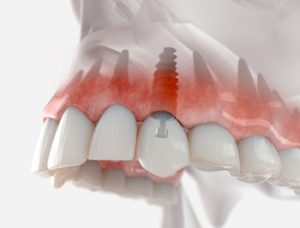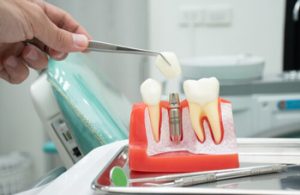If you’ve been considering dental implants, you may have stumbled across the allure of dental implants Thailand offers—enticing prices, exotic locales, and, supposedly, quality care. Reading dental implant reviews can help you assess dental implant centres’ quality in Thailand and Australia, providing insights into patient experiences and treatment outcomes. But is this option truly the best choice for your smile? While dental implants in Thailand are popular for their affordability, getting them in Australia might be the smarter, safer choice in the long run. This blog will dive into why Australia stands out as a destination for your dental implant treatment, covering everything from the advantages of local care to the complexities of dental implant dentistry.
What Are Dental Implants?
Before diving into the Thailand vs Australia debate, let’s clarify what dental implants are. Dental implants are artificial tooth roots manufactured from titanium or ceramic zirconia, surgically placed into the jawbone to replace missing teeth. They function like natural teeth, providing a strong foundation for artificial tooth replacements such as crowns, bridges, or dentures. Implants effectively treat missing teeth, ensuring long-term stability and maintaining the jaw bone structure.
Why Are Dental Implants So Popular?
Dental implants have emerged as a favourable solution for people dealing with missing teeth. Their popularity lies in their ability to mimic natural teeth in appearance and function. Dental implants enable you to eat, speak, and smile confidently, unlike conventional dentures or false teeth that may not feel as secure. The dental implant procedure involves several stages—implant post placement, healing, and securing the artificial tooth. While the process may sound complex, the results are worth it.
Now that we’ve covered the basics, let’s explore why getting dental implants in Australia makes more sense than in Thailand.
Types of Dental Implant Procedures
When it comes to dental implants, there isn’t a one-size-fits-all solution. The type of dental implant procedure you need depends on your specific dental health and the condition of your jawbone. Here are the main types of dental implant procedures available:
- Single Tooth Implant:
A single-tooth implant is ideal for missing a single tooth. This procedure involves placing a single implant post into the jawbone, which acts as a sturdy root for the new tooth. A crown is then attached to the post, restoring your tooth’s natural look and function.
- Multiple Tooth Implant: For those missing several teeth, multiple tooth implants can be a game-changer. This procedure involves placing multiple implant posts in the jawbone, supporting a bridge or denture. This restores your smile and ensures you can chew and speak comfortably.
- Full Arch Implant: If you’re missing an entire arch of teeth, a full arch implant might be the best option. This procedure involves placing a series of implant posts along the jawbone, supporting a full arch bridge or fixed denture. It offers a stable and permanent solution for extensive tooth loss.
The Appeal of Dental Implants in Thailand: What’s the Hype?
Thailand has become a highly popular hotspot for medical tourism, especially for dental treatments like dental implants. The main attraction? Lower prices. A dental implant in Thailand can cost significantly less than in Australia. Thailand’s dental clinics also tout state-of-the-art equipment and highly trained implant dentists. These dental centres offer comprehensive packages, often bundled with resort-style accommodations, making it seem like a win-win situation for those looking to combine dental treatment with a holiday.
Dental implant reviews can provide valuable insights into the quality of care and patient satisfaction in Thailand.
But is it really as perfect as it sounds?
The Hidden Costs of Dental Implants in Thailand
While the upfront price of dental implants in Thailand might seem appealing, the hidden costs can catch you off guard. Here are some key factors to consider:
- Aftercare and Follow-ups: Dental implants require ongoing care after the initial surgery. In Australia, follow-up appointments with your local dentist are convenient and often part of the treatment plan. If complications arise after receiving implants in Thailand, you may need to book return flights, which can quickly negate the initial savings.
- Complications and Revisions: In the rare event of implant failure or infection, it’s crucial to have easy access to qualified professionals for prompt intervention. Travelling back to Thailand for revisions or corrective surgery can be both time-consuming and expensive, not to mention stressful.
- Quality Control: The standards of care can vary significantly from clinic to clinic in Thailand. While some centres are highly reputable, others may not adhere to the same stringent safety and hygiene protocols as in Australia. This disparity in quality control can increase the risk of complications, such as implant failure or infection.
- Communication and Legal Recourse: In case of an issue with your dental treatment, navigating language barriers and seeking legal recourse in Thailand can be challenging. In Australia, you have clearer channels for addressing concerns, whether through your dentist, legal professionals, or health regulators.
Why Dental Implants in Australia Are Worth It
Reviews of dental implants consistently emphasise the high standard of care and patient satisfaction at dental implant centres throughout Australia, with several undeniable advantages to choosing treatment in the country:
Access to Post-Procedure Care
After dental implant surgery, ongoing dental care is critical. Australia offers easy access to high-quality dental clinics where you can undergo necessary check-ups, dental implant treatments, and possible adjustments. With Thailand dental implants, follow-up care is more challenging unless you’re prepared to travel back and forth. Your local dentist is far more accessible if any issues arise after the implant procedure, from gum irritation to implant failure.
Dental implants Experts
In Australia, you can trust that dental professionals are certified and trained under rigorous professional standards. You’re more likely to find experienced implant dentists who regularly perform dental implant procedures such as implant-supported dentures, and dental implant bridges. In Thailand, while many dental clinics are reputable, it’s harder to assess the credentials of dental professionals from afar.
Safety and Sterilisation Standards
Australian dental clinics operate under stringent regulations to maintain hygiene and safety, which is particularly important for surgical procedures like dental implants. The risk of infection is significantly lower when clinics adhere to strict safety protocols. In contrast, there are world-class dental centres in Thailand, but not all clinics meet the same standards of sterilisation.
Personalised Treatment Plans
One key advantage of getting dental implants in Australia is the personalised care you’ll receive. Australian dentists take the time to evaluate your unique dental health, bone density, and jaw structure before recommending a treatment plan. Complex procedures like bone grafting, posterior implants, and full-mouth dental implants require meticulous planning. In contrast, Thailand’s dental implant centres may not offer the same level of individualised care due to the volume of international patients.
Sedation Options for Comfortable Treatment
We understand that dental procedures, especially complex treatments like dental implants, can be anxiety-inducing for many patients. To guarantee a comfortable experience, a variety of sedation options are available to correspond to your specific needs:
- IV Sedation (Sleep Dentistry): For patients experiencing moderate to severe anxiety, intravenous (IV) sedation, also known as sleep dentistry, provides a deeply relaxed state while keeping you conscious but unaware of the procedure. It’s particularly helpful for lengthy or more involved treatments.
- Happy Gas (Nitrous Oxide): For those who experience mild to moderate anxiety, nitrous oxide—commonly known as “happy gas”—is an effective sedation option. Administered through a mask, it helps you feel calm and relaxed during your procedure. One of the key benefits of happy gas is that its effects fade away quickly, allowing you to continue your normal activities shortly after treatment.
Opting for a local Australian dental clinic ensures that your dental implant treatment will be managed with the utmost level of care and professionalism, from your first consultation through to the final outcome.
The Quality of Implant Brands in Australia
Another critical factor in your treatment’s success is the type of dental implant brands used. In Australia, premium implant brands are widely used, providing durable, high-quality options.
In comparison, while Thailand does offer some of the same leading dental implant brands, the quality can vary between clinics. Without in-depth research, ensuring you’re getting the best for your smile is hard. In Australia, you can be confident that the implant brands and materials used adhere to strict quality standards.
Comprehensive Aftercare: Why It Matters

Legal Recourse and Insurance: What You Need to Know
Another critical difference between Australia and Thailand is the availability of legal recourse and insurance coverage. Australian dental clinics are subject to local laws and regulations, offering you protection in case something goes wrong. Many Australian health insurance plans also provide partial coverage for dental implants, making the upfront costs more manageable. In contrast, seeking legal recourse in Thailand can be challenging, especially for international patients, and insurance rarely covers procedures done overseas.
FAQs About Dental Implants: Australia vs Thailand
How long does the dental implant procedure take?
The dental implant process usually spans several months. It starts with the placement of the implant post, followed by a healing period of 3-6 months for the jawbone to fuse with the implant. Once healing is complete, the artificial tooth or crown is attached. Some clinics offer same-day implants, but this option depends on the condition of your jawbone and other factors. It’s essential to consult with your dentist to receive a personalised treatment timeline.
Can I get dental insurance coverage for implants in Australia?
Yes, many Australian health insurance plans offer partial coverage for dental implants. This can significantly reduce the out-of-pocket costs. Be sure to check with your provider about what’s covered. Overseas dental treatments, such as those done in Thailand, are typically not covered by Australian insurance.
How successful are dental implants?
Dental implants have a very high success rate, often reported to be around 95-98% when done by experienced professionals. The success of your implant depends on factors like the health of your jawbone, the quality of the implant brand, and the aftercare you receive. In Australia, you can trust that your dentist will use high-quality materials and provide thorough aftercare to ensure the best outcome.
What is bone grafting, and will I need it for dental implants?
Bone grafting is a procedure that rebuilds the jawbone when there isn’t sufficient bone to support an implant. This may be required if you’ve had bone loss due to missing teeth or gum disease. In Australia, your dentist will assess whether bone grafting is necessary during your consultation. In some overseas clinics, this crucial step can be overlooked or hastily performed.
How long do dental implants last?
With the right care, dental implants can endure a lifetime. While the crowns or dentures attached to the implants may need replacement after 10-15 years due to normal wear, the implant post itself can remain intact indefinitely with proper maintenance. Regular dental check-ups and good oral health are essential for keeping your implants in excellent condition over time.
What should I expect during the healing period?
After dental implant surgery, there will be a healing period of 3-6 months as your jaw bone integrates with the implant post. During this time, it’s essential to adhere to your dentist’s instructions and attend all recommended follow-up appointments to ensure proper healing. Minor discomfort, swelling, and bruising are normal, but if you experience significant pain or signs of infection, you should contact your dentist immediately.
Can I replace all my missing teeth with implants?
Yes, full-mouth dental implants are an excellent option for replacing all your missing teeth. This can involve placing multiple implant posts to support a full arch of artificial teeth, or using implant-supported dentures. Full mouth dental implants offer a permanent, stable solution that looks and works like natural teeth.
What happens if my implant fails?
Although uncommon, implant failure can happen as a result of infection, improper healing, or poor oral hygiene. In Australia, if your implant fails, your dentist can quickly intervene to correct the issue. In contrast, if your implant fails after receiving treatment abroad, you may need to travel back for corrective surgery, adding inconvenience and cost.
Can I combine dental treatment with a holiday in Thailand?
While combining dental treatment with a holiday might sound appealing, it’s important to consider the recovery time needed after surgery. Dental implant surgery is a significant procedure, and you may need to rest rather than enjoy tourist activities. Furthermore, complications or infections can severely impact your holiday plans, making a relaxing getaway more stressful than anticipated.
The Bottom Line: Why Australia Wins for Dental Implants

Dental implant reviews from patients highlight the high quality of care and patient satisfaction at dental implant centres in Australia. These testimonials emphasise the excellent outcomes and the variety of dental implant options available.
When it comes to something as essential as your smile, quality should never be compromised. So, before booking that flight to Thailand, consider the long-term benefits of choosing a local, trusted dentist for your dental implant procedure in Australia.
Ready for Your Smile Transformation?
If you’re considering dental implants and want the best care possible, look no further than your local Australian dental clinic. Don’t hesitate to reach out to us at Finesse Dental. Call us at (02) 8806 0790, and our team will be happy to assist you with all your dental needs.
Remember, while Thailand may offer an appealing price, your health and peace of mind are priceless. Choose wisely. Choose local. Choose Australia.
Note: Any surgical or invasive procedure carries risks. Before proceeding, you should seek a second opinion from an appropriately qualified health practitioner.
References:
minfo. (n.d.). The true cost of dental tourism: Hidden expenses and long-term consequences. Medium. https://medium.com/@minfo/the-true-cost-of-dental-tourism-hidden-expenses-and-long-term-consequences-d8cd38c8dd52
Cleveland Clinic. (n.d.). Dental implants. Cleveland Clinic. https://my.clevelandclinic.org/health/treatments/10903-dental-implants
WebMD. (n.d.). What to know about dental implant complications & risks. WebMD. https://www.webmd.com/oral-health/what-to-know-about-dental-implant-complications-risks
Colgate. (n.d.). Implant-supported denture. Colgate. https://www.colgate.com/en-us/oral-health/dentures/implant-supported-denture
5. Australian Dental Association. (2015). ADA guidelines for infection control. ADA. https://ada.org.au/getmedia/e99d888d-c0ab-4be1-b889-85e5193fd7e7/ADA_Guidelines_Infection_Control_Guidelines.pdf


 A single-tooth implant is ideal for missing a single tooth. This procedure involves placing a single implant post into the jawbone, which acts as a sturdy root for the new tooth. A crown is then attached to the post, restoring your tooth’s natural look and function.
A single-tooth implant is ideal for missing a single tooth. This procedure involves placing a single implant post into the jawbone, which acts as a sturdy root for the new tooth. A crown is then attached to the post, restoring your tooth’s natural look and function.